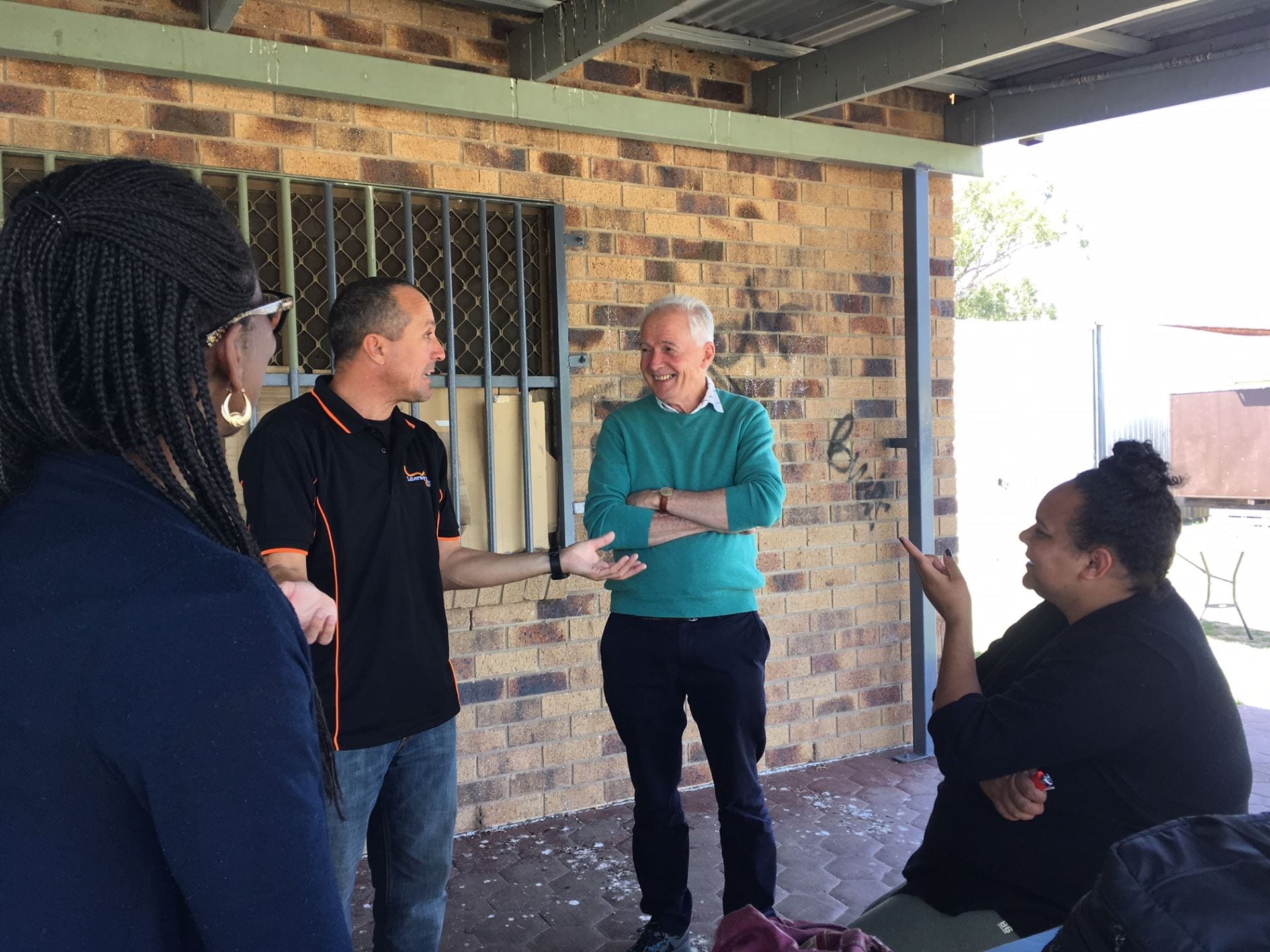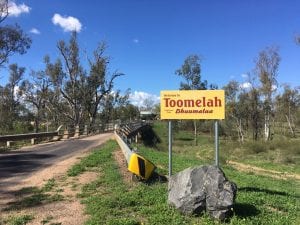Image: Discussing the program in Toomelah. L-R: Rose Amazan, Felix Hernandes – Cuban ‘Yes I Can!’ adviser and UNE visiting academic, Bob Boughton and Myisha Edwards – a program facilitator from the community.
As a funded adult literacy campaign in the remote Aboriginal community of Toomelah, northern NSW comes to a close, a University of New England (UNE) education research team says it is “vitally important” the work continues to support the community’s enthusiasm for learning and change.
UNE researcher Associate Professor Bob Boughton has worked in Indigenous communities for forty years and supported the community-based Indigenous organisation, Literacy for Life Foundation, directed by UNE’s Professor Jack Beetson, to assess and evaluate the effectiveness of the Cuban-designed Yes, I Can! adult literacy model in remote Aboriginal communities since 2012. They’re now involved in a longitudinal study looking at the long-term impacts of improved literacy in Aboriginal communities.
This year, Associate Professor Boughton and fellow UNE education researchers Dr Rose Amazan, Dr Julie Collins, Dr Vegnes Maniam and Dr Keita Takayama followed the rollout of the literacy campaign with community consultations in Toomelah, hearing how the campaign has impacted the community and how it has shaped their perceptions and desires for the future.
Dr Amazan, who interviewed women, says it is clear the program is not just about imparting basic skills.
“Literacy for Life is much more than learning to read and write. It’s more like a social practice. I think that’s why a lot of the women were feeling empowered in the community and have more confidence and self-esteem and the ability to speak up,” she said.
“It gives people a sense of affirmation and confidence,” Dr Collins agrees, “and they start to make a range of other changes in their life.”
Over three days in September, the education research team led in-community activities such as interviews with past participants of the Literacy for Life campaign and stakeholders, collecting testimonies from women in the community for a Literacy for Life submission to a Human Rights Commission Inquiry, conducting classroom observations and discussions with Literacy for Life staff and Toomelah residents and leaders to evaluate the program and discern the future research and education priorities.
Associate Professor Boughton and the team say there was a visible lift in the community’s morale during UNE’s visit, which brings with it a great responsibility.
“The consensus in the community over the three days was that we helped people feel respected and proud about the campaign work and their roles in it. They commented that UNE listened to them and took them seriously as having views and experiences that deserved attention,” Associate Professor Boughton said.
Associate Professor Boughton and Dr Takayama say when working with communities, you have to be prepared for the learnings to go both ways.
“We went into the community with some research questions, which is a necessary part of the research process. We knew we wanted to look at, for example, the health impact of reading and writing skills and the impact of the campaign on the students’ and parents’ attitudes to school.
“But when we got there, the Toomelah community was able to tell us exactly what kind of issues they were dealing with and what resources they needed. So the question becomes: what do we do now? What kind of expertise and resources do we have as a university to work with the people of Toomelah?” Dr Takayama said.
Dr Vegnes said the list of ideas the Toomelah people had for working with UNE, preserving culture and embedding learning programs in the community were fantastic. The ideas included a directory of Toomelah history and cultural resources and a place to store and collect oral histories, training for parents to learn how to talk to children about learning and school, rather than just what goes on in the playground, pathways from literacy to TAFE and a live-in community orientation program for UNE teacher education students.
Associate Professor Boughton says the community consultations were an essential part of the process to build a common knowledge and understanding of issues, and to find out what the community really wants.
“When we listen and pay attention and say we’re interested in what’s happening here, that actually is important. Our humanity is undermined where we don’t take these people’s views into account. There are 800 million people in the world who can’t read or write. And their knowledge is just as important as ours in terms of finding long-term, sustainable ways to connect with higher education participation and equity.
“So we have to listen to these 800 million people whose knowledge of the way the world works is in some ways superior to our own. It’s part of us growing too; that we learn to develop this common knowledge,” Associate Professor Boughton says.
UNE continues to support communities where it has helped roll out a campaign with Literacy for Life, such as through ongoing program evaluations and staff training. But for the Toomelah research team, the work is far from done.
“We all feel it is vitally important that we don’t just become another ‘outsider’ who stepped in for a little while to try and make a difference. There is a lot of energy and vitality in the Toomelah community now. We don’t want to lose that momentum, and we’re looking at ways to ensure we remain committed to the region in the long term,” Associate Professor Boughton said.




Recent Comments